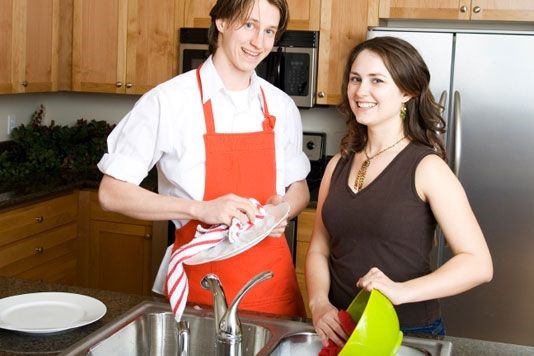
The kitchen sink was once the stage of real drama. Andrew Webb mourns the gossip, suds and tea towels involved in the art of washing up.
When I was younger and extended family came to visit, Mum would do ‘a lunch’. On the morning of the day itself there was a palpable air of excitement in the house; extra cleaning had to be done, along with shopping for special items, and no one was allowed to use the loo or make a mess anywhere until the guests had arrived.
Put the kettle on!
As the allotted hour of arrival approached, my sister and I kept vigil at the front window listening for the sound of a car in the street outside. Meanwhile in the kitchen the kettle was kept at a rolling boil, ready for the cups of tea and a full debrief of the traffic conditions and journey highlights.
Lunch is ready
Later we’d all sit down for lunch; probably salad and cold cuts in the summer, or something meatier in the winter. Then with the meal over, the men would help clear the table before moving into the lounge or out to the cars to check the oil levels or some such, while the aunts, mums and grandma did the dishes. Us kids were press-ganged into putting away as we knew where everything lived.
Let me give you a hand…
The doing of the dishes was where the real gossip, chat and exchange of views seemed to happen. Back then no-one owned a dishwasher, just as no-one owned a space ship. Washing up – like shelling peas or licking the cake bowl – was part of the process of putting food on the table. The air was filled with the chink and clatter of dishes; tea towels put in three minute bouts like boxers before being too wet to use and hung over the oven door handle to dry, their duties being taken up by fresh ones.
When domestic order was once again restored, the kettle was put back on, as was the telly, and we all settled down, the world now put to rights. You probably have similar memories yourself.
Where does this live?
Washing up on your own is dull, and washing up full of food and half cut after everyone’s gone home may get the job done, but in the morning your slap-dash technique doesn’t stand up under daylight’s evil glare. Far better then, if you’re feeding friends you know well and not your partner’s boss, to get them involved. Washing up with a friend is a chance to confide and talk to each other in a different way. You’re both engaged in a task, so there’s all the dealing with ‘you’ve missed a bit’ and ‘where does this sieve live?’ stuff. This of course sits like a sauce on top of life’s meatier issues like love and loss. It’s a sort of duet, a dance; a totally different space and activity on which to host a conversation, and different things are said than at the table. No-one ever says ‘ooh please let me help you fill the dishwasher’, that’s just boring.
You try it next time you have people round, make washing up part of the whole process, tell ‘em it’s retro. It gives both host and guest a chance to talk in a more personal way. You also end up with a nice clean kitchen, and all your pots, pans and plates put back in new and unusual places.
More dinner party advice
12 dinner party table tips from a restaurant pro